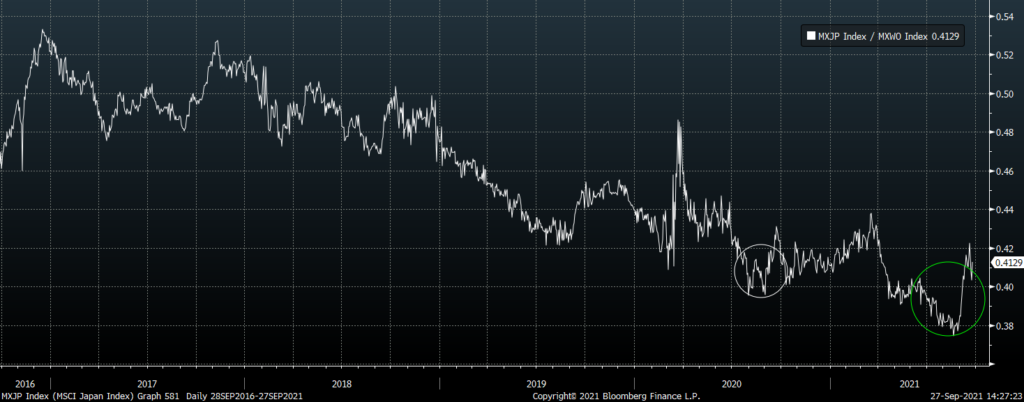Adrian Gornall: “Current valuations make Japanese equities attractive”
Adrian Gornall of Astris Advisory in Tokyo talks to Hedge Funds Club’s Stefan Nilsson about interest in the Japanese equity market picking up, the arrival of a new Japanese PM, China’s impact on Japan, what post-State of Emergency reopening will mean and much more.
Adrian Gornall has over 30 years of experience in financial markets with a particularly strong connection with Japan. Adrian meets with hundreds of different companies a year, providing institutional investors with details and analysis of those meetings. He joined Astris Advisory in January 2020, moving back to Japan for the first time in over a decade.
Interest in the Japanese equity market has picked up recently. What has this meant for Astris Advisory?
Across all of Astris’s businesses – investment advisory, corporate advisory and fund placement – the level of offshore interest has picked up significantly this year. Once the State of Emergency lifts and travel restrictions are eased, we expect to see a wave of business travellers into Japan. From a market perspective, recently reported earnings from larger market-cap, global cyclical companies such as TEL (8035), DMG Mori (6141), JFE (5411) and NYK (9101) have been particularly strong and these companies have been adept at introducing new technologies against the backdrop of new working practices. Structural improvement in costs, improving production efficiency and supply constraint suggests the outlook for profitability is particularly good. Current valuations make Japanese equities attractive here relative to other markets. In the smaller market cap area where I focus, stocks are facing the headwind of the TSE Membership review which is currently taking place. Uncertainty on indexing has hurt performance as one of the reasons for buying new listings had been the prospect of promotion to the 1st section. However, the same confluence of positive impacts from technology, digital transformation and demand for specific new solutions is allowing for the generation of a great deal of alpha for our clients. This year alone we have met with senior management of over 170 companies and continue to average two companies per day. We meet “growth” names, “value” names and all the new listings as quickly as they will see us.
A new Japanese Prime Minister will take over in early October and then we will have a general election in November. With four PM candidates currently sharing policy ideas and priorities, do you think the choice of a new LDP leader will have any material impact on the markets or is it “same old, same old”?
“Politics always leads the Japanese market’s performance” is a well-known and well-worn adage. Since Mr. Abe’s departure, Mr. Suga’s tenure and public approval rating has certainly had the same overall trajectory as Japanese markets. I like to show people the chart from Bloomberg below which is simply the MSCI Japan Index divided by the MSCI World Index. Mr. Abe resigned on 20th August 2020 (white circle) and Mr. Suga’s recent announcement of his intention to resign has catalysed the recent positive price action (green circle).

However, thanks to Japanese people and corporates pulling together, vaccination rates have quietly risen to impressively high levels and the rise continues. We see an end to the emergency and a general return to more normalised economic activity over the coming months.
With the somewhat awkward situation of a new PM taking over in October and then facing a general election only weeks later, is the market taking into account that Japan could have three different PMs in October/November? Is that a worry or does no one cares as it is LDP running the show no matter what?
Policy changes are likely to be only incremental. However, I do expect substantial initiatives in the area of establishing an overall framework of guiding protocols from the Digital Agency. In particular, I look for guidelines in the area of digital security, once established, to drive an acceleration of the pace of technology implementation. The ‘2027 problem’ related to SAP ending support of its legacy product is going to increasingly come into focus for companies in Japan. Whether to migrate a legacy database and associated CRM functions into a new architecture or allow SAP to effectively force you into their new solution is a question which the majority of companies are going to have to answer soon.
Some of the big swings in the Chinese markets are spilling over to Japan. How worried should investors in the Japanese markets be about what’s happening in China?
I essentially see Chinese assets as hard to invest in directly for the foreseeable future. Geopolitically China and the West have come to the end of a 50-year entente that began with the table tennis diplomacy in 1971. It is clear that ideology is now leading the debate in China and they look to be heading back to the 1960s and a more inward focus. The positive news for both global and local investors in Japan is that many Japanese companies have a very long and profitable history in the PRC and through their equities offer the ability to invest in China without direct exposure. The geopolitical environment will be of course difficult but not impossible to navigate. Manufacturing process solutions companies such as Fanuc (6954), SMC (6273) and Keyence (6861) which help China to raise its overall manufacturing competencies, should be able to continue to grow market share in China. On the other hand, SPE businesses may find it more difficult. Meanwhile, brand owners and other retail facing businesses will continue to benefit from Chinese nationals’ overall growth in income and inbound tourism. However, this will come hand in hand with consumer boycotts as political tensions may flare from time to time. Astris work with legendary investor Jim Chanos and will be organising a webinar for Japanese investors on the morning of the 20th of October. Jim has been very vocal of late across many media platforms, describing the Evergrande crisis as being “far worse” for investors than a “Lehman-type situation” as it points to the end of the property-driven growth model. If you would like to attend the webinar, please contact my colleagues Tadahiro Kunimasa (kunimasa@astrisadvisory.com) or Hiro Yokoyama (yokoyama@astrisadvisory.com).
As Japan is now approaching critical mass when it comes to Covid vaccinations, what do you think the reopening of the economy will mean for the Japanese equity market? Is it already priced in or is there a potential upside?
I see the major Japanese indices making new all-time highs and substantial relative outperformance versus the rest of the world over the next three years.
Which sectors are likely to benefit the most from a reopening? Is it all booze, vice and entertainment or will those categories suffer as people suddenly need to get off their bums, put on a suit and go back to the office?
I am of course very positive about the outlook for certain areas of retail as confidence returns. We recently wrote on Goldwin (8111) which we see becoming a ‘cult’ brand overseas. They have a very strong ESG profile and a clearly articulated strategy from the perspective of their carbon footprint. However, we are more structurally bullish on technology shares. We focus on larger global technology leaders such as TEL (8035), Advantest (6857) and the manufacturing capex companies mentioned above. We also very much like domestic technology companies. These include Ibiden (4062) and Renesas (6723), offering product security through their domestic locations. We are very positive on domestic niche solutions providers in both value and growth styles. Recent eye-catching visits include Brains Technology (4075), User Local (3984) and Mobilus Corp (4370). In addition, against a background of very strong end-user demand, we see a wave of M&A among systems integration companies where there is oversupply and little differentiation among smaller second-tier companies. The fallout from the TSE review we mentioned above will be the major catalyst for this wave of consolidation. Against this backdrop, we view NTT Data (9613 JT) as a must-own equity. In battery technologies we see Toyota emerging as a leader with the new solid-state product it recently announced new patents in. Recent new listing Nippon Denkai (5759) will be a clear beneficiary of this. Japan also has a very substantial lead in the implementation of hydrogen solutions. You only have to look at the fuel cell driven buses on the streets to see this clearly.









